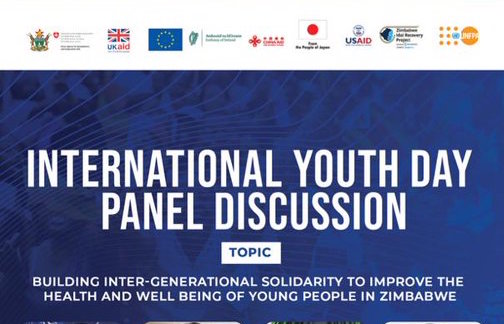|
Getting your Trinity Audio player ready...
|
On International Youth Day, the United Nations Population Fund (UNFPA) in Zimbabwe and its partners have called for greater support to ensure young people reach their full potential by making critical investments in their health, education and well-being.
The theme for this year’s International Youth Day is Intergenerational Solidarity: Creating a World for All Ages.
In Zimbabwe, adolescents and youth are experiencing adverse life outcomes, including unintended early or teenage pregnancy, child marriage, and school dropouts. Early and teenage pregnancy have major health consequences for adolescent mothers and their babies and contribute around 30% of maternal deaths.
Young people face difficulties in accessing social services such as health and education due to stigma, negative cultural norms, lack of knowledge, low-risk perception, a health system that is not youth-centred, and economic disempowerment or poverty. This leads to them engaging in negative coping strategies such as early sexual debut and unprotected sex, resulting in high HIV infections and teenage pregnancy. Drug and substance abuse are worryingly on the increase among young people and also contribute to negative life outcomes.
In addition, the problem of GBV is affecting many young people. At least 1 in 3 women and girls have experienced GBV at least once in their lifetime. The Zimbabwe multi-hazard context, including the adverse effects of climate change, disease outbreaks and economic uncertainty, exacerbates the risk of exposure to GBV with potentially life-threatening consequences.
“Investment in young people’s health, education, economic opportunities and wellbeing is critical in supporting them to reach their full potential so that they contribute to national development. The COVID-19 outbreak and the recurrent waves have been a huge drawback for young people’s development,” said Blessing Nyagumbo, UNFPA Programme Specialist – Adolescents and Youth at a panel discussion to mark International Youth Day.
Zimbabwe, like many other developing countries, is experiencing a demographic transition (youth bulge), which can be turned into a “demographic dividend”. Several countries in South East Asia have benefitted from the demographic transition and the question for Zimbabwe is how Zimbabwe can best realise the full benefits of the demographic transition.
“The Government of Zimbabwe greatly appreciates the great collaboration with UNFPA towards ensuring young people reach their full potential over the years but there is still more we can do together with them and other partners to invest more in young people,” said Memory Kanyati from the Ministry of Youth, Sport, Arts and Recreation and Zimbabwe Youth Council Manager.
UNFPA is working with key partners – government, development partners and civil society to support efforts that ensure young people reach their full potential. This includes contributions to the development of inclusive policies, legislation and accountability frameworks that promote and protect adolescents’ and youth’ sexual reproductive health and Rights (SRHR). It also includes supporting age-appropriate Comprehensive Sexuality Education in schools, tertiary institutions and out-of-school settings through community-based programmes such as the Sista2sista girls’ mentorship clubs and Parent to Child Communication groups.
In community settings, the programmes integrate SRHR/GBV information and service referrals with youth economic empowerment and community engagement. The health sector is being supported with a view to improving access to and availability of comprehensive and integrated services that respond to the needs of adolescents and youth.
“When there is a meeting of minds it’s not difficult for partners to come together to address the challenges that affect young people and work towards providing opportunities for young people to be able to flourish and thrive,” said Lawrence Lewis Musa, Senior Regional Programmes Officer, Embassy of Switzerland, at a panel discussion to commemorate International Youth Day.
“We have been working with UNFPA over the years under the Safeguard Young People Programme towards young people’s development in an effort to ensure that young people make meaningful contributions to the development of the country.”
Sexual and Reproductive Health and Rights Thematic Lead from Plan International Hellen Machimbirike said young people need support to access SRHR services.
“Many young people face challenges accessing SRHR services for one reason or another. We must ensure our health workers and other service providers create supportive environments for young people to access services,” said Machimbirike.
UNFPA work in Zimbabwe is supported by the Governments of Britain, China, Japan, Ireland, Sweden, and Switzerland as well as the European Union, World Bank and the United States Agency for International Aid.
“We extend gratitude to all our funding partners who support our work towards advancing sexual and reproductive health and rights for women and young people in particular,” said UNFPA Country Representative Dr Esther Muia. “We continue to count on your support to ensure young people reach their full potential and that Zimbabwe can reap the demographic dividend.”






